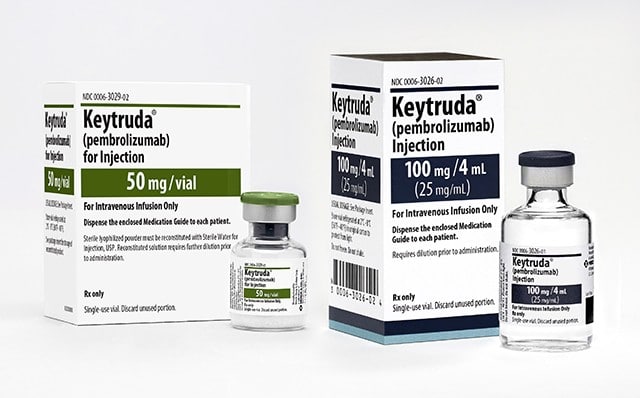Pembrolizumab is approved for advanced endometrial carcinoma
April 2022: Pembrolizumab (Keytruda, Merck) was approved by the Food and Drug Administration as a single agent for patients with advanced endometrial carcinoma that is microsatellite instability-high (MSI-H) or mismatch repair deficient (dMMR), as determined by an FDA-approved test, who have disease progression after prior systemic therapy in any setting and are not candidates for curative surgery or radiation.

The VENTANA MMR RxDx Panel (Ventana Medical Systems / Roche Tissue Diagnostics) was also authorised by the FDA today as a companion diagnostic device for selecting patients with dMMR in solid tumours who are eligible for pembrolizumab treatment. The FoundationOne CDx (F1CDx, Foundation Medicine, Inc.) was previously approved by the FDA as a companion diagnostic device for identifying patients with MSI-H in solid tumours who are candidates for pembrolizumab treatment.
Efficacy was assessed in 90 patients with unresectable or metastatic MSI-H or dMMR endometrial cancer in Cohorts D and K of KEYNOTE-158 (NCT02628067), a multicenter, non-randomized, open-label, multi-cohort experiment. Polymerase chain reaction or immunohistochemistry were used to determine the MSI or MMR tumour status, respectively. Patients were given 200 mg of pembrolizumab intravenously every 3 weeks until they experienced unacceptable toxicity or disease progression. Patients who are treated with pembrolizumab and do not develop illness might be treated for up to 24 months.
The main efficacy outcome measures were the objective response rate (ORR) and duration of response (DoR), as determined by a blinded independent central review using RECIST v1.1, adjusted to follow a maximum of 10 target lesions and 5 target lesions per organ. The ORR was 46%. (95 percent CI: 35, 56). The median DoR was not met (2.9, 55.7+), with 68 percent of respondents responding for 12 months and 44 percent responding for 24 months.
Fatigue, musculoskeletal pain, rash, diarrhoea, pyrexia, cough, decreased appetite, pruritis, dyspnea, constipation, soreness, abdominal ache, nausea, and hypothyroidism were the most prevalent side events in patients (20 percent). Pneumonitis, colitis, hepatitis, endocrinopathies, nephritis, and skin adverse responses are all immune-mediated side effects related with pembrolizumab.
Pembrolizumab is given at a dose of 200 mg every 3 weeks or 400 mg every 6 weeks until disease progression or unacceptable toxicity occurs, which can last up to 24 months.
View full prescribing information for Keytruda.
Susan Hau is a distinguished researcher in the field of cancer cell therapy, with a particular focus on T cell-based approaches and cancer vaccines. Her work spans several innovative treatment modalities, including CAR T-cell therapy, TIL (Tumor-Infiltrating Lymphocyte) therapy, and NK (Natural Killer) cell therapy.
Hau's expertise lies in cancer cell biology, where she has made significant contributions to understanding the complex interactions between immune cells and tumors.
Her research aims to enhance the efficacy of immunotherapies by manipulating the tumor microenvironment and exploring novel ways to activate and direct immune responses against cancer cells.
Throughout her career, Hau has collaborated with leading professors and researchers in the field of cancer treatment, both in the United States and China.
These international experiences have broadened her perspective and contributed to her innovative approach to cancer therapy development.
Hau's work is particularly focused on addressing the challenges of treating advanced and metastatic cancers. She has been involved in clinical trials evaluating the safety and efficacy of various immunotherapy approaches, including the promising Gamma Delta T cell therapy.
- Comments Closed
- May 5th, 2022



KEYTRUDA, Merck, Pembrolizumab, Roche Tissue Diagnostics, Ventana Medical Systems
CancerFax is the most trusted online platform dedicated to connecting individuals facing advanced-stage cancer with groundbreaking cell therapies.
Send your medical reports and get a free analysis.
🌟 Join us in the fight against cancer! 🌟
Привет,
CancerFax — это самая надежная онлайн-платформа, призванная предоставить людям, столкнувшимся с раком на поздних стадиях, доступ к революционным клеточным методам лечения.
Отправьте свои медицинские заключения и получите бесплатный анализ.
🌟 Присоединяйтесь к нам в борьбе с раком! 🌟